- Home
- stock market
- 13 mind-blowing facts about Greece's economy
13 mind-blowing facts about Greece's economy
Greece has a history of financial troubles — the country's first default occurred way back in the fourth century B.C.

In the modern era, Greece has defaulted a grand total of five times — which is only half as many times as the default leaders, Venezuela and Ecuador, have.

Greece defaulted on its external sovereign debt obligations five times:
- 1826 — It happened during the Greek War of Independence from the Ottoman Empire.
- 1843 — Greece used funds from the Loan of 1832 on its military and "the upkeep of Otto, a Bavarian prince." The country stopped making payments in 1843.
- 1860 — After this default, Greece was kicked out of international markets until 1878.
- 1894 — When the markets opened, lenders were overeager, borrowing increased to unsustainable levels, and the government suspended payments in 1893.
- 1932 — This happened during the Great Depression.
Source: Investopedia
Greece has spent a combined 90 years — almost half of the time since its independence — in financial crisis.
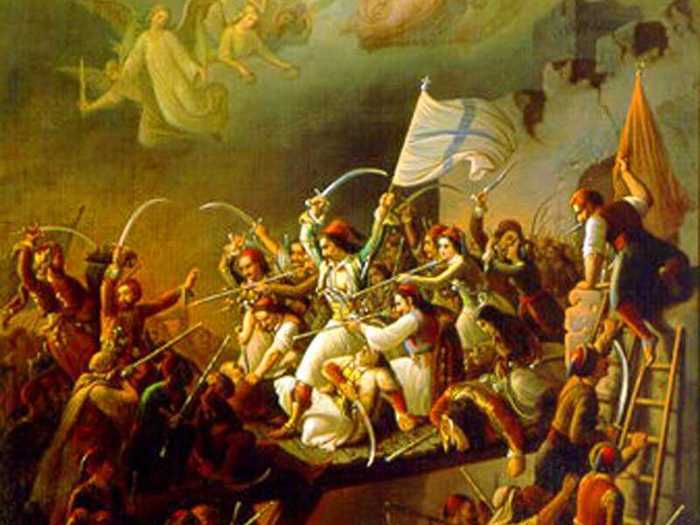
Greece finally gained independence from the Ottoman Empire in 1830 after Great Britain, France, and Russia intervened to help out in the War of Greek Independence. (Fun fact: even poet Lord Byron joined in to support Greece.)
The country has spent 90 out of 196 years since then in financial crisis.
Corruption costs Greece about 8% to 10% of GDP per year.
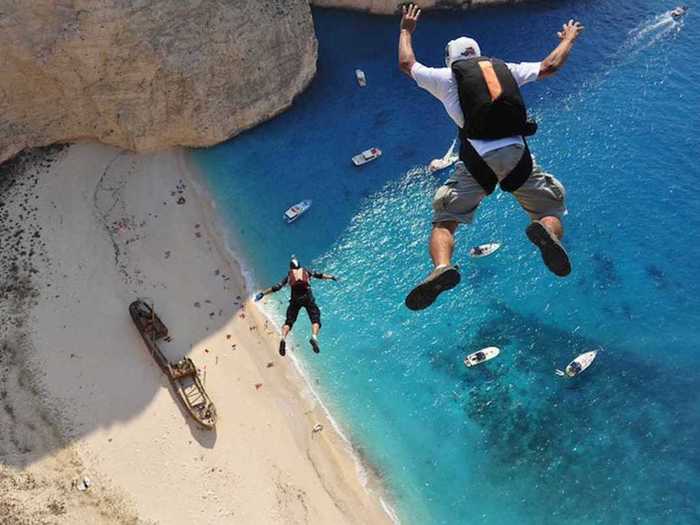
A Brookings Institute study by Daniel Kaufmann estimated that corruption cost Greece about 8% of gross domestic product per year. (Some have estimated it as high as 10%.) Notably, a large bulk of it involves ordinary citizens doing day-to-day activities.
"If Greece had better control of corruption — not to Swedish standards, but even at Spain's level — it would have had a smaller budget deficit by 4% of gross domestic product" on average over the past five years, Kaufmann wrote back in 2010.
A 2014 study by the European Commission said Greece was the most corrupt country in the European Union — on par with China.
Source: Greece's Horizons: Reflecting on the Country's Assets and Capabilities
Self-employed Greeks are "paying over 100% of their reported income flows to debt servicing on consumer debts."

Upper-middle-class professionals in Greece dodge taxes.
A blurb from a University of Chicago paper from 2012 says "the self-employed are paying over 100% of their reported income flows to debt servicing on consumer loans." Analysts have suggested that this means they are underreporting their incomes.
In 2009, €28 billion of tax was evaded by self-employed people alone.
Source: Business Insider
49.7% of Greece's young active population is unemployed.
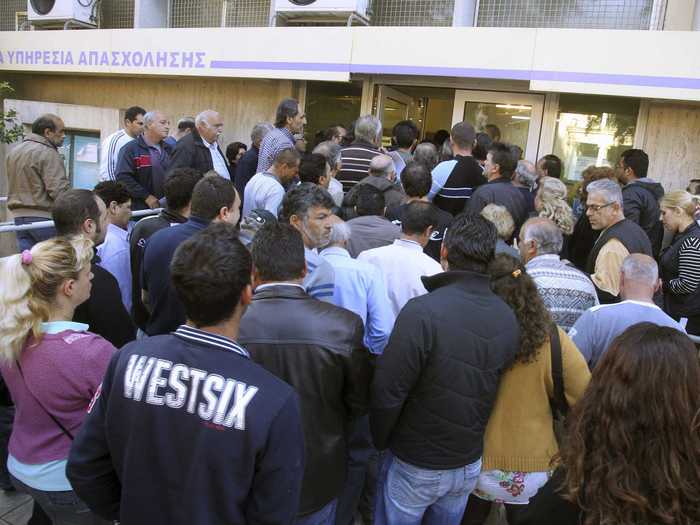
Last year, youth unemployment was recorded at 56.4%.
Overall, Greece's unemployment rate remained steady at 25.6% for March 2015. It hit an all-time high of 28% back in September 2013.
Source: Trading Economics
63.5% of Greeks between ages 18 and 34 live at home with their parents.

And over half of those between the ages of 25 and 34 live at home. These numbers have gone up since 2010.
"Moving out of the house you grew up in is a rite of passage," Bloomberg reporters Flavia Krause-Jackson and Giovanni Salzano write. "Moving back in with your parents is a cry for help. In Greece, it's come to just that."
Source: Bloomberg
Only 23.9% of Greece's population is under the age of 24. By comparison, 47% of Saudi Arabia's population falls in that age bracket.
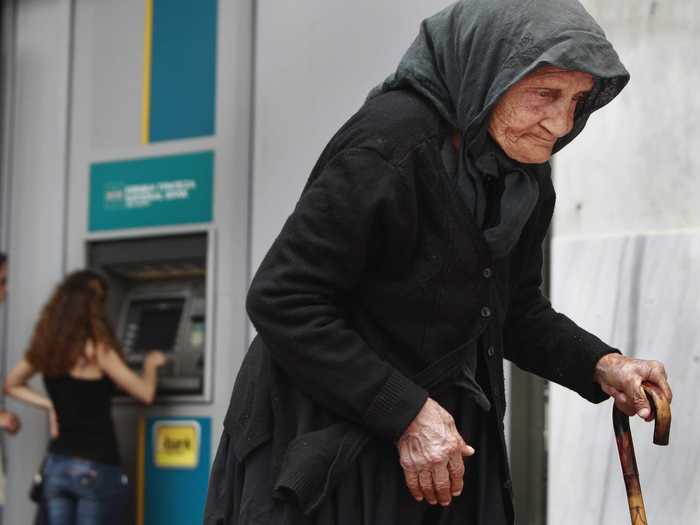
Greece has an aging population: Only 9.8% of Greeks are ages 15 to 24, while 32.9% are over the age of 55. The birth rate has fallen to 1.3 babies per woman.
This is a twofold problem as rising pension costs will have to be paid for by a labor force that's shrinking.
Source: CIA Factbook
Greece is almost five times as big as Massachusetts, but Massachusetts' GDP is twice that of Greece.

Greece's gross domestic product is $242.2 billion, while Massachusetts' is $420.75 billion.
Massachusetts is 10,554 mi2 (27,336 km2), while Greece is 50,949 mi2 (131,957 km2).
Source: Bureau of Economic Analysis, World Bank
Greece's economic nightmare today is worse than this point in the US' Great Depression.
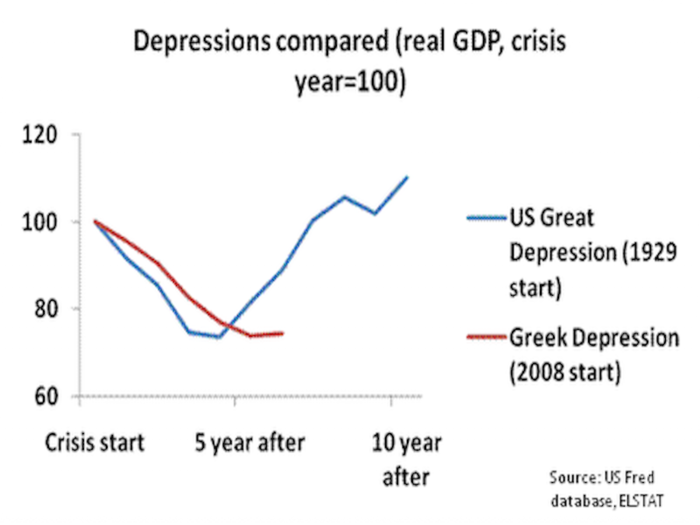
This chart from RBS Economics shows the trajectory of gross domestic product indexed to just before things got bad in the US during the 1920s and in Greece just a few years ago.
Source: RBS Economics
Greece's annual production of olive oil weighs as much as 1,575 blue whales.

Greece, the third-largest olive-oil player in the world after Spain and Italy, produces 300,000 tonnes a year. Ninety percent of that is exported to the European Union.
Fun fact: Some of the olive trees planted in Greece during the 13th century are still producing olives.
An adult blue whale weighs 420,000 pounds.
Source: USDA Foreign Agricultural Service, "Ancient Greece"
Greece's cigarette consumption per capita is roughly 28 times that of India.

Greece has the third-highest cigarette consumption per capita at 2,795.
India's cigarette consumer per capita is around 97.
Source: The Washington Post
The first Olympic games occurred over 1,250 years before the fall of the Roman Empire.

The first Olympic Games occurred in 776 B.C. They continued until A.D. 393, when Emperor Theodosius declared that these "pagan cults" must be banned.
Most historians agree that the Roman Empire "officially" ended in A.D. 476.
Source: Olympic.org
13 mind-blowing facts about Greece's economy

Popular Right Now
Popular Keywords
Advertisement